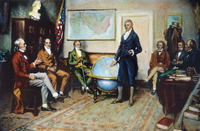Aktuelle Konferenzen
"The Body in/of Don DeLillo's Plays" Online Conference
Amerika-Institut München (LMU), 20.-21. Juni 2024 (online)
Organisation: Dr. habil. Johanna Hartmann (Uni Halle)
The conference "The Body in/of Don DeLillo's Plays" is dedicated to the topic of embodiment in DeLillo's dramatic oeuvre. This conference is a collaboration with the English Department at the University of Texas at Austin and the Austin-based Harry Ransom Center, that holds the Don DeLillo papers.
Please click here to download the conference program and here for the conference brochure.
München, 15.-17. Juni 2023 im Amerikahaus München
in Kooperation mit dem NS-Documentation Center for the History of National Socialism
Organisation: PD Dr. A. Charlotte Lerg und Dr. Johannes Schmid (Department of English and American Studies, Europa-Universität Flensburg)
“HistorioGRAPHICS: Framing the Past in Comics” is the first international conferences of this scale to bring together comics scholars, historians and practitioners. It sets out to critically assess the current state of research on graphic narrative as means of writing – and drawing – history and of examining, representing, and engaging with the past. We aim to facilitate exchange among researchers, artists, and educators. The conference program promises to generate fruitful insights for a discourses on comics as part of public and academic history. In 21 panels on a range of topics, from Indigenous history and representations of the Holocaust to legal history, legacies of colonialism, and many more, the participants will discuss historioGRAPHICS from multiple disciplinary and professional perspectives.
The conference was kindly supported by the DFG, the Bavarian American Academy, the Gesellschaft für Comicforschung and the City of Munich.
For more details and a full list of panels and contribution see the conference website at www.historiographics.com
Bridging the Ivory Tower and the Streets: Academia and Activism in Times of Crisis Ordinariness
Ca’ Foscari University and Venice International University, June 8-10, 2023
The colloquium of Prof. Klaus Benesch is pleased to announce a new iteration of its annual workshop to take place June 8-10, 2023 at Ca’ Foscari University and Venice International University.
Titled “Bridging the Ivory Tower and the Streets: Academia and Activism in Times of Crisis Ordinariness,” the workshop takes Noam Chomsky’s seminal 1967 essay “The Responsibility of Intellectuals” as a starting point and seeks to interrogate the relationship between academics and activism as well as the particular relevance of the resulting questions to American Studies and the humanities at large.
Within the current international political, economic, social, and environmental climate, Chomsky’s questions have lost nothing of their urgency: Which kind of “intellectuals” are we? Are we “responsible” in upholding current systems of power, or do we rather become “wild men in the wings”? Contrarily, scholars have also argued that scholar-activism undermines academia’s credibility. If “the master’s tools will never dismantle the master’s house,” as Audre Lorde famously stipulated, can we as academics engage in dismantling work from our privileged position within the ivory tower at all? And if so, how?
We are thrilled to be joined by our guest speakers Burcu Toğral Koca (Viadrina Center B/ORDERS IN MOTION), Maryna Shevtsova (University of Ljubljana), and Michael Wutz (Weber State University). Presentations will further be held by faculty and students from the Amerika-Institute, members of Klaus Benesch’s colloquium, and students from Ca’ Foscari University. We sincerely thank Prof. Simone Francescato and Prof. Mena Mitrano from Ca’ Foscari University for co-organizing and for their continued support in making this workshop possible.
Please check out our Venice Booklet
For more information, please contact Steph Berens at berens@amerikanistik.uni-muenchen.de and Carole Martin at carole.martin@amerikanistik.uni-muenchen.de.
International Conference: 200 Years of the Monroe Doctrine. Visions of the Americas since the 1820s//Congreso international: Q 200 años de la Doctrina Monroe. Visiones de las Américas desde la década de los 1820
Amerikahaus München, 24.-25.03.2023
Organisation: Prof. Dr. Ursula Prutsch (AI LMU), Prof. Dr. Michael Hochgeschwender (AI LMU), Dr. Carlos Alberto Haas (Historicum LMU)
 In December 1823, U.S. President James Monroe gave an annual political speech before the U.S. Congress that went down in history as the Monroe Doctrine and had a lasting impact on the relationship between the United States, Latin America and Europe. From a European perspective, the Monroe Doctrine is considered the only relevant vision of the Americas that unfolded between 1820 and 1830. Yet, at the same time, there existed visions—some competing, some intertwined with the United States—that encompassed the entire continent. Simón Bolivar's Pan-American utopia is worth mentioning here, as well as the Portugese-Brazilian dynasty’s visions of making Brazil the center of a New World; both visions represent global aspirations. Therefore, the 200th anniversary of the Monroe Doctrine offers an ideal occasion to shed light on these core issues of transatlantic foreign policy by speakers from the United States, Latin America and Europe in English and Spanish. Our conference will go well beyond the period of the 1820s, discuss the political, cultural, and social contexts of the America visions, and analyze their long-term effects.
In December 1823, U.S. President James Monroe gave an annual political speech before the U.S. Congress that went down in history as the Monroe Doctrine and had a lasting impact on the relationship between the United States, Latin America and Europe. From a European perspective, the Monroe Doctrine is considered the only relevant vision of the Americas that unfolded between 1820 and 1830. Yet, at the same time, there existed visions—some competing, some intertwined with the United States—that encompassed the entire continent. Simón Bolivar's Pan-American utopia is worth mentioning here, as well as the Portugese-Brazilian dynasty’s visions of making Brazil the center of a New World; both visions represent global aspirations. Therefore, the 200th anniversary of the Monroe Doctrine offers an ideal occasion to shed light on these core issues of transatlantic foreign policy by speakers from the United States, Latin America and Europe in English and Spanish. Our conference will go well beyond the period of the 1820s, discuss the political, cultural, and social contexts of the America visions, and analyze their long-term effects.
Photo: "The Birth of the Monroe Doctrine" by Clyde O. DeLand 1912 ©Public Domain
+++Conference Language: English and Spanish+++
New Orleans, A Sense of Place: Environmental and Cultural Resilience, an Interdisciplinary Conference.
LMU Munich and Amerikahaus, 21-22 July 2022.
Co-convened by the Amerika-Institut and the Rachel Carson Center.
Collaboration with Bryan Wagner, Professor, English Department, University of California, Berkeley.
Co-organizers Amy Mohr, Nadine Klopfer, Pierre-Héli Monot.
Invited speakers from Berkeley, Tulane University, and the University of New Orleans.
Funded by the Rachel Carson Center, the LMU-UCB Research in the Humanities Cooperation, and the Bavarian American Academy.
LMU Latin America Forum 2022, eine interdisziplinäre Konferenz
31. Mai bis zum 1. Juni 2022 an der LMU München, Senatssaal
Das Amerika-Institut wurde durch Frau Prof. Dr. Ursula Prutsch vertreten.
 Bei dieser zweitägigen, interdisziplinären Veranstaltung stellten Wissenschaftlerinnen und Wissenschaftler der LMU gemeinsam mit ihren Kolleginnen und Kollegen aus sieben Ländern Lateinamerikas ihre aktuelle Arbeit aus vier Themenbereichen vor: Wissenschaftskultur, Umwelt, Gesundheit, Soziale Dynamiken.
Bei dieser zweitägigen, interdisziplinären Veranstaltung stellten Wissenschaftlerinnen und Wissenschaftler der LMU gemeinsam mit ihren Kolleginnen und Kollegen aus sieben Ländern Lateinamerikas ihre aktuelle Arbeit aus vier Themenbereichen vor: Wissenschaftskultur, Umwelt, Gesundheit, Soziale Dynamiken.
Etnias - die Völker der Welt: Wandbild in Rio de Janeiro (Brasilien) © Ricardo Borrmann
Das Konferenzprogramm finden Sie hier.
Activist Writing – The Pamphlet in Practice, History, Media, and the Public Sphere
Amerika-Insitut, LMU Munich, Online Conference - February 24-26,2022
Pamphlets are everywhere. In recent years, the polemical texts of the #MeToo movement, of Black Lives Matter, of anticapitalist movements, of Brexit, of anti-abortion coalitions, or of digital secessionists have demonstrably affected the normative fabric of Western societies. Pamphletary literature and the responses it elicits are at the core of social history and are drivers of revolutionary events. From disenfranchised groups defending their existence to transnational coalitions advocating for systemic change, pamphlets are both a preeminent medium of political transformation and a massively popular genre of literature.
How does the pamphlet, both in its traditional and digital forms, shape and frame the objectives of contentious politics? What pamphletary impulses lead to political action, and what political actions crystalize as normative change? The international bilingual conference “Activist Writing —The Pamphlet in Practice, History, Media, and the Public Sphere” addresses these questions from an interdisciplinary perspective.
Where My Girls At? Contemporary Feminist Art
A conference for graduate students and emerging scholars of American Studies
Amerika-Insitut, LMU Munich, July 2, 2020
Against the background of the emergence of the #MeToo movement and Fourth Wave Feminism, this conference examines North American art and artivism and its capacity to inspire change, reformulate feminist ideas, and reimagine a feminist aesthetics. We aim to explore the role of art and visual culture in contemporary feminist movements as well as artistic practices by feminist artists.

